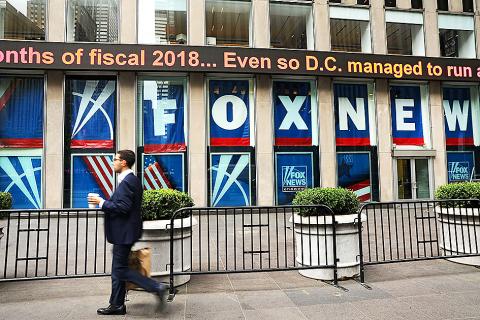Comcast Corp on Wednesday offered US$65 billion to lure Twenty-First Century Fox Inc away from a merger with Walt Disney Co, saying its all-cash bid was about 19 percent higher and launching the first salvo in what could be a bidding war between two of the largest US media companies.
Comcast chief executive officer Brian Roberts said he is confident regulators would allow a Comcast-Fox deal after AT&T Inc’s court victory on Tuesday, which allowed it to buy Time Warner Inc for US$85 billion.
Some analysts see some difficulties for Comcast-Fox, which would add Fox’s movie and television studios to Comcast’s NBC Universal, but Roberts said in a letter to Fox that he would offer the same conditions as Disney and promised to fight for the deal in court if necessary.

Photo: AFP
Comcast is expected to lead a wave of traditional media companies trying to combine distribution and production to compete with Netflix Inc and Alphabet Inc’s Google.
The younger firms produce content, sell it online directly to consumers and often offer lucrative targeted advertising.
Comcast in a statement outlined an offer that was similar to Disney’s, including a commitment to the same divestitures. It said that it would agree to litigate any action taken by the US Department of Justice to block the deal.
Comcast offered US$35 per Fox share for the media assets, compared with Disney’s stock offer, worth US$29.18 per share at the close of trade on Wednesday.
Comcast offered a US$2.5 billion reverse termination fee if the deal did not go through, the same as Disney. It also offered to pay Fox’s US$1.525 billion breakup fee owed to Disney, if Fox went with Comcast.
Comcast said it intends to pursue its US$30 billion acquisition of Sky PLC in parallel with its Fox bid. Comcast bid for Sky in April, after Fox’s bid for the remainder of the European pay-TV group it did not already own was delayed by regulators.
Justice Department lawyers who tried to stop AT&T’s US$85 billion deal expect consumers will lose out as bigger companies raise prices, and some lawyers see that as a concern in a Comcast-Fox deal, which would put two movie studios and two major television brands under one roof.
“One cannot ignore the fact that there’s less independent content to go around,” after the AT&T deal, said Henry Su, an antitrust expert with Constantine Cannon LLP.
Comcast might have a tough time winning over Fox’s largest shareholder, Rupert Murdoch’s family. They own a 17 percent stake and would face a multibillion dollar capital gains tax bill if he accepts an all-cash offer from Comcast, tax experts have said.

BYPASSING CHINA TARIFFS: In the first five months of this year, Foxconn sent US$4.4bn of iPhones to the US from India, compared with US$3.7bn in the whole of last year Nearly all the iPhones exported by Foxconn Technology Group (富士康科技集團) from India went to the US between March and last month, customs data showed, far above last year’s average of 50 percent and a clear sign of Apple Inc’s efforts to bypass high US tariffs imposed on China. The numbers, being reported by Reuters for the first time, show that Apple has realigned its India exports to almost exclusively serve the US market, when previously the devices were more widely distributed to nations including the Netherlands and the Czech Republic. During March to last month, Foxconn, known as Hon Hai Precision Industry

Taiwan Semiconductor Manufacturing Co (TSMC, 台積電) and the University of Tokyo (UTokyo) yesterday announced the launch of the TSMC-UTokyo Lab to promote advanced semiconductor research, education and talent development. The lab is TSMC’s first laboratory collaboration with a university outside Taiwan, the company said in a statement. The lab would leverage “the extensive knowledge, experience, and creativity” of both institutions, the company said. It is located in the Asano Section of UTokyo’s Hongo, Tokyo, campus and would be managed by UTokyo faculty, guided by directors from UTokyo and TSMC, the company said. TSMC began working with UTokyo in 2019, resulting in 21 research projects,

Ashton Hall’s morning routine involves dunking his head in iced Saratoga Spring Water. For the company that sells the bottled water — Hall’s brand of choice for drinking, brushing his teeth and submerging himself — that is fantastic news. “We’re so thankful to this incredible fitness influencer called Ashton Hall,” Saratoga owner Primo Brands Corp’s CEO Robbert Rietbroek said on an earnings call after Hall’s morning routine video went viral. “He really helped put our brand on the map.” Primo Brands, which was not affiliated with Hall when he made his video, is among the increasing number of companies benefiting from influencer

Quanta Computer Inc (廣達) chairman Barry Lam (林百里) yesterday expressed a downbeat view about the prospects of humanoid robots, given high manufacturing costs and a lack of target customers. Despite rising demand and high expectations for humanoid robots, high research-and-development costs and uncertain profitability remain major concerns, Lam told reporters following the company’s annual shareholders’ meeting in Taoyuan. “Since it seems a bit unworthy to use such high-cost robots to do household chores, I believe robots designed for specific purposes would be more valuable and present a better business opportunity,” Lam said Instead of investing in humanoid robots, Quanta has opted to invest